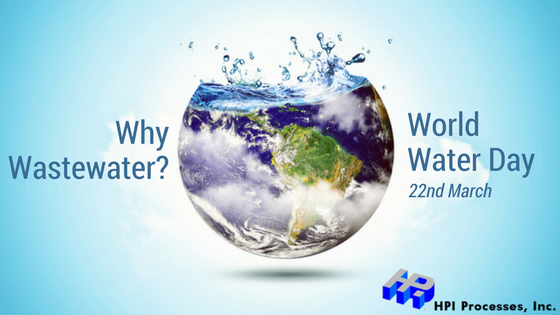
Every year, World Water Day is dedicated to a specific theme in accordance with the UN’s focus to address future challenges in water and sanitation. The 2017 theme, “Wastewater,” encourages the reduction and reuse of wastewater in order to keep fresh water resources in the natural environment while keeping pollutants out. It emphasizes the importance of sustainable development in determining the future of our planet and its many inhabitants. This post is dedicated to the theme of wastewater and will discuss various aspects of wastewater recycling.
Importance of Wastewater Treatment
There are two major problems facing the global water supply; the first being the pollution of our natural water bodies. With increasing economic development around the world and the continually advancing use of chemicals in pharmaceuticals and manufacturing, earth’s water is being bombarded by pollution that is growing in volume and complexity. If wastewater treatment exists in a given community, it is typically not designed to catch every type of contaminant before the water is released back to the environment. Our second concern is the excessive extraction of water from the environment. For a long time people have been able to rely on groundwater to meet their needs in dry regions or when surface waters are overly polluted. Unfortunately these reservoirs aren’t as bottomless as we had hoped and we are now facing a myriad of problems surrounding the exhaustion of aquifers and other freshwater sources. Mankind is now in a position to adapt to the limits of the environment so as not to dry up with it.
Wastewater recycling is one of the most effective and sustainable practices to alleviate the strain on water resources around the world. While wastewater recycling is also viable on a municipal/agricultural level, we will now focus on its industrial importance. When it comes to industrial pollutants, it is far easier to treat wastewater at the source where the contaminants are known and isolated. It is a lot more difficult to remove the contaminants from a large municipal waste stream at a public treatment plant and as a result they slip into the environment. Far too often, we see the accumulation of metals and other contaminants including carcinogens and toxins in freshwater and marine ecosystems. While the government enacts a variety of codes and regulations on wastewater discharge, it rests on the shoulders of individual companies to handle their water in the most responsible way. For this reason wastewater recycling must be economically beneficial and tailored to the specific needs of every industry. There are currently many treatment systems available for the removal of contaminants from industrial wastewater which utilize physical, chemical, and biological processes. The variety of methods available ensures that each industry has a reliable solution. Eliminating contaminants on-site and reducing water uptake with recycling is the best way to guarantee the quality and abundance of water in local ecosystems and drinking supply.
If you are a company seeking to learn more about how to achieve water sustainability, reach out to the professionals at HPI Processes, Inc. for a thorough and informed consultation.
